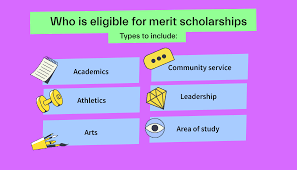In the world of college financing, there are two main types of scholarships: need-based and merit-based. Need-based scholarships are awarded to students who demonstrate financial need, while merit-based scholarships are awarded to students who demonstrate academic excellence or other exceptional achievements.
What is A Merit Scholarship? Merit scholarships are a great way to help pay for college without having to worry about your financial situation. They can be awarded by colleges, universities, private organizations, and even government agencies. The amount of money you can receive from a merit scholarship varies depending on the scholarship and your individual qualifications.
In this blog post, we will discuss what merit scholarships are, how they work, and how to apply for them. We will also provide some tips on how to increase your chances of getting a merit scholarship.
What Is A Merit Scholarship?
A merit scholarship is a type of financial aid that is awarded to students based on their academic achievements, athletic abilities, artistic talents, or other special skills or talents. They are not based on the student’s financial need.
Merit scholarships can be awarded by colleges, universities, private organizations, and even government agencies. The amount of money you can receive from a merit scholarship varies depending on the scholarship and your individual qualifications.
Types Of Merit Scholarships
There are many different types of merit scholarships available. Some of the most common types include:
- Academic scholarships: These scholarships are awarded to students with high GPAs or standardized test scores.
- Athletic scholarships: These scholarships are awarded to students who excel in sports.
- Artistic scholarships: These scholarships are awarded to students who have talent in the arts, such as music, dance, or theater.
- Leadership scholarships: These scholarships are awarded to students who demonstrate strong leadership skills.
- Community service scholarships: These scholarships are awarded to students who are dedicated to community service.
How Do Merit Scholarships Work?
Here’s how merit scholarships typically work:
Eligibility: Each merit scholarship has its own set of eligibility requirements. These requirements may include a minimum GPA, standardized test scores, participation in extracurricular activities, or a demonstrated commitment to community service.
Application Process: Students typically apply for merit scholarships by submitting an application form, which may include essays, letters of recommendation, transcripts, and any other supporting documentation required by the scholarship committee.
Selection Process: Scholarship committees review applications and select recipients based on the criteria outlined in the scholarship guidelines. They may consider factors such as academic excellence, extracurricular involvement, leadership skills, and the overall strength of the student’s application.
Awarding and Renewal: Recipients are notified of their scholarship award and provided with information about disbursement and renewal requirements. Some merit scholarships are renewable, meaning they can be received for multiple years if the student maintains the eligibility criteria.
Disbursement: Merit scholarships are typically awarded as a one-time payment or as a renewable scholarship that can be received for multiple years. The amount of money you can receive from a merit scholarship varies depending on the scholarship and your individual qualifications.
Renewal Requirements: For renewable merit scholarships, students must maintain the eligibility criteria specified by the scholarship committee. This may include maintaining a minimum GPA, participating in extracurricular activities, or demonstrating continued commitment to the scholarship’s goals.
Who is Eligible For Merit Scholarships?
Eligibility for merit scholarships can vary depending on the specific scholarship program, but some general criteria that are often considered include:
Academic Achievement: A strong academic record is typically a key factor in merit scholarship eligibility. This may involve maintaining a high GPA, achieving certain standardized test scores, or demonstrating excellence in specific academic subjects.
Athletic Abilities: For athletic scholarships, students must demonstrate exceptional skills and achievements in a particular sport. This usually involves participation in competitive sports leagues, achieving recognition for athletic prowess, or demonstrating the potential to contribute significantly to a college’s athletic program.
Artistic Talents: Merit scholarships for the arts are often awarded to students who exhibit exceptional talent in music, dance, theater, visual arts, or other artistic disciplines. This may involve a portfolio of creative work, participation in recognized competitions or performances, or demonstrated mastery of artistic skills.
Leadership Skills: Leadership scholarships recognize students who have demonstrated strong leadership qualities, such as the ability to motivate and inspire others, take initiative, and effectively manage projects or teams. This may involve holding leadership positions in extracurricular activities, demonstrating leadership in community service initiatives, or exhibiting strong leadership potential in academic or personal endeavors.
Community Service: Merit scholarships for community service are awarded to students who have demonstrated a commitment to making a positive impact on their communities. This may involve volunteering for organizations, initiating or participating in community service projects, or demonstrating a strong dedication to social responsibility and civic engagement.
Special Skills or Talents: Merit scholarships may also be awarded to students who possess unique skills or talents that are not necessarily tied to academics, athletics, or the arts. This could include exceptional talents in writing, public speaking, technology, or other areas that are valued by the scholarship committee.
In addition to these general criteria, some merit scholarships may have specific requirements related to the student’s background, interests, or intended field of study. For instance, scholarships may be targeted towards students from underrepresented groups, pursuing STEM fields, or demonstrating a commitment to a particular cause or mission.
How To Apply For Merit Scholarships
Applying for merit scholarships can be a rewarding process that helps you finance your college education and recognize your achievements. Here’s a step-by-step guide to applying for merit scholarships:
1. Start your search early: Begin your scholarship search well in advance of college application deadlines. This gives you ample time to research opportunities, gather necessary documents, and prepare strong applications.
2. Identify your strengths and interests: Reflect on your academic accomplishments, extracurricular involvements, special skills, and personal qualities that make you a strong candidate for merit scholarships.
3. Research scholarship opportunities: Utilize online scholarship databases, college websites, and financial aid resources to identify merit scholarships that align with your strengths and interests.
4. Read scholarship guidelines carefully: Pay close attention to the eligibility requirements, application deadlines, and submission procedures for each scholarship. Ensure you meet all the criteria before applying.
5. Gather required documents: Prepare transcripts, standardized test scores, letters of recommendation, essays, and any other supporting materials specified in the scholarship guidelines.
6. Craft compelling essays: When required, write essays that showcase your strengths, experiences, and aspirations. Highlight your unique contributions and how you exemplify the scholarship’s values.
7. Proofread meticulously: Review your application thoroughly for any grammatical errors or typos. A polished application reflects your attention to detail and professionalism.
8. Submit applications on time: Adhere strictly to the application deadlines for each scholarship. Late submissions may result in disqualification.
9. Follow up with scholarship committees: After submitting your application, consider sending a polite thank-you note to the scholarship committee for their consideration.
Where Can I Apply For Merit Scholarship?
Merit scholarships can be awarded by various organizations, including colleges, universities, private foundations, government agencies, and even individual donors. Here are some of the places where you can apply for merit scholarships:
Your college or university: Many colleges and universities offer their own merit scholarship programs based on academic achievement, extracurricular involvement, and other factors. Check your college’s website or financial aid office for information about their merit scholarships.
National scholarship organizations: There are numerous national scholarship organizations that offer merit scholarships based on various criteria. Some well-known national scholarship organizations include:
National Merit Scholarship Corporation (NMSC): This organization awards scholarships to high-scoring PSAT/NMSQT test-takers.
Jack Kent Cooke Foundation: This foundation provides scholarships to high-achieving students from low-income families.
Coca-Cola Scholars Foundation: This foundation offers scholarships to outstanding high school seniors who demonstrate leadership, service, and academic excellence.
Private foundations: Many private foundations offer merit scholarships to students pursuing specific fields of study or demonstrating unique talents or achievements. Use online scholarship directories or search for foundations related to your interests to find relevant opportunities.
Government agencies: Some government agencies offer merit scholarships to students in specific fields or with particular backgrounds. For instance, the National Science Foundation (NSF) offers scholarships for students pursuing STEM fields.
Individual donors: Some individuals establish merit scholarship funds through colleges, universities, or private foundations. These scholarships may have specific criteria related to the donor’s interests or passions.
Employer-sponsored scholarships: Some companies offer merit scholarships to employees’ children or students pursuing careers related to their industry. Check with your parents’ or guardians’ employers to inquire about potential scholarship opportunities.
Community organizations: Local community organizations may also offer merit scholarships to students within their service area. Check with your local community centers, youth organizations, or religious institutions for available scholarships.
Online scholarship databases: Several online scholarship databases aggregate information about merit scholarships from various sources. These databases allow you to search for scholarships based on your interests, academic profile, and other criteria.
Benefits of Merit Scholarships
There are many benefits to receiving a merit scholarship. These benefits include:
- Reducing the cost of college: Merit scholarships can help reduce the amount of student loans you need to take out, which can save you a lot of money in the long run.
- Making college more affordable: Merit scholarships can make college more affordable for your family.
- Attracting attention from colleges and universities: Receiving a merit scholarship can make you more attractive to colleges and universities.
- Boosting your resume: Merit scholarships can boost your resume and make you more competitive in the job market.
Conclusion
Merit scholarships can be a valuable resource for students who want to help pay for college. By following the tips in this blog post, you can increase your chances of getting a merit scholarship and making your college dreams a reality.
FAQS
Are merit scholarships only for academic achievements?
While academic performance is a common criterion for merit scholarships, these awards can also be based on other accomplishments such as leadership, community service, artistic talents, or athletic achievements. Merit scholarships aim to recognize and reward a diverse range of outstanding qualities and accomplishments.
Are merit scholarships renewable?
The renewability of merit scholarships depends on the terms set by the scholarship provider. Some scholarships are one-time awards, while others may be renewable for each year of a student’s academic program, contingent upon maintaining a specified level of academic performance or meeting certain criteria.


